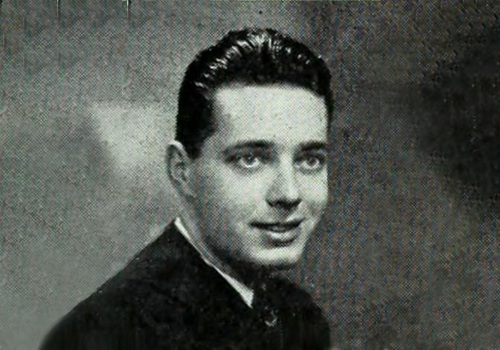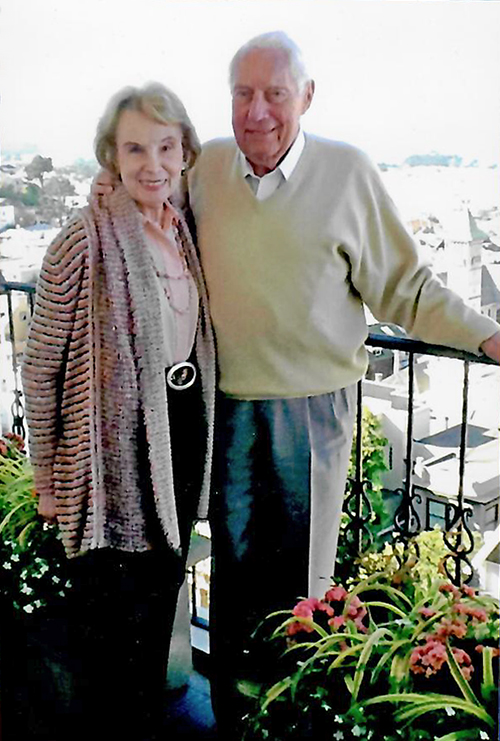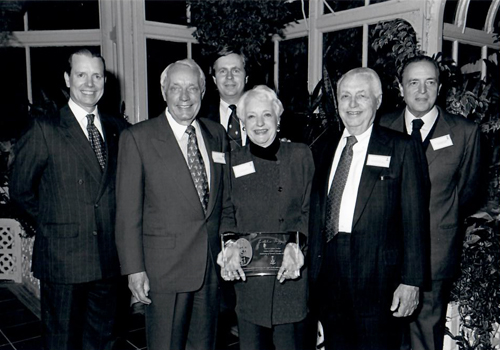When Oscar winner Roberto Benigni and his wife Nicoletta Braschi received honorary degrees from the University of Toronto in 2015, the celebrated actors befriended an undisputed star of Italian studies, Arts & Science alumnus Ernest Goggio.
That story was one of many shared by faculty and friends as they reflected on the passing of Goggio on January 11, 2021 at the age of 97.
A life-long goodwill ambassador for U of T and the Italian diaspora, Goggio helped establish the Emilio Goggio Chair in Italian Studies with his siblings to honour their mother Emma and father, chair of the Department of Italian and Spanish from 1946-56.

Among its far-reaching impacts, the chair endowment helped pave the way for Umberto Eco — author of The Name of the Rose — to come to the Department of Italian Studies in 1998 as a visiting scholar, a highlight Goggio marked by travelling to Toronto from his home in San Francisco to meet the world-famous writer and hear one of his lectures.
The visit by Benigni and Braschi was another event not to be missed by Goggio, who earned his bachelor of arts in math and physics in 1944 as a member of University College.
“Roberto and Nicoletta connected extremely well with Ernest, so much so that a couple of years later, he visited them in Italy. They were really fond of Ernie,” says University of Toronto Mississauga Professor Salvatore Bancheri, who was the Emilio Goggio Chair from 2011–19.
“As we say in Italian, the three of them had a ‘simpatía’ or affection that was born immediately,” adds Michael Lettieri, professor of Italian studies and UTM vice-dean of academic experience, who was at the faculty club lunch where the actors met Goggio.
While he found success in myriad business ventures, Goggio’s passion was promoting an appreciation of the contributions by Italians to North America and the world.
He took special pride in the impact of the Emilio Goggio Chair he and his family established in 1995 at the Department of Italian Studies, one the largest in the world outside of Italy.
For more than two decades, the chair has given the department resources to host visiting scholars, organize conferences, offer courses, support graduate and undergraduate students, sponsor a departmental newsletter, collaborate on events with Italian cultural groups and publish a series of books and lecture papers in English and Italian.
Part of the chair endowment by the Goggio family has also been directed to build on the approximately 40,000 titles found in the Italian collection in the Robarts Library of the University of Toronto, which is among the largest such collections in North America, ranking behind only Harvard University and Yale University.

“He told me he knew his father would have been so pleased,” says Professor Emerita Olga Pugliese, who was the Emilio Goggio Chair from 1997–2002.
Goggio took a keen interest in the annual reports from the chair outlining all the things the endowed funds were supporting, and was always looking for ways to do even more, says Pugliese, who corresponded with him and wife Connie for years.
Two years after establishing the Emilio Goggio Chair, Goggio and his family created the Emilio and Emma Goggio Fund for Italian Studies in 1997 to support acquisitions for the Italian book collection at U of T’s Thomas Fisher Rare Book Library.
In 2000, Goggio and his brother Alfred set up the Emilio Goggio Graduate Scholarship for full-time students “who foster greater understanding between the peoples in Italy and North America” or broaden the teaching of Italian and Italian studies literature.
Sadly, Goggio also had occasion to establish the Melissa Pulver-Goggio Scholarship in Italian Studies in 2015 after the death of his daughter, whose portrait hangs across from his father’s in the department.
“I remember younger members of his family who were touring the department remarking on how well the likeness of Emilio’s portrait recalled their grandfather, and on the resemblance to Ernest himself,” says Italian studies Professor Domenico Pietropaolo, who was the Goggio Chair from 2002–11.
Father and son shared a legacy of fostering an appreciation of all-things Italian stretching back 100 years.
Goggio loved hearing the story of how his father helped start the American Association of Teachers of Italian in the 1920s. The association publishes Italica, one of the most important journals of Italian studies in the world, says Lettieri, the publication’s first Canadian editor.
“You could see the pride in his eyes when I told him that story about his father.”
The legacy will continue to grow with a history-making event, says Emilio Goggio Chair Nicholas Terpstra.
A special project funded by the chair will mark the 700th anniversary of the death of Italian poet Dante Alighieri — author of The Divine Comedy — with a series of videos called Toronto Salutes Dante, including the first-ever known translation of Dante into Indigenous languages, says Terpstra.
Part of the first canto of the epic work’s first section — The Inferno — will be read in Anishinaabemowin and part of the final canto will be in Stoney Nakoda. The translations are being prepared specifically for this project and are being read in the video by the translators.
“It’s such a perfect idea of what Goggio himself was trying to emphasize, the connections between Italy and North America, and we’ll have a strong Indigenous element,” says Terpstra. “Ernest would have loved that.”

In a further salute to Canada’s diversity, most of the remaining cantos of The Inferno will be read in a different language, including Farsi, Arabic, Swedish, Portuguese, Mandarin, American Sign Language, Russian, Slovak, Thai, Spanish, Bulgarian, German, Ukrainian and Sanskrit, as well as French, Latin, English, Italian and 10 Italian dialects.
The 34 canto readings will be posted one at a time at regular intervals on the department’s YouTube channel starting March 25, which — in Dante’s time — was traditionally New Year’s Day in Florence.
The Department of Italian Studies is also planning a Goggio Fellowship at the department’s Frank Iacobucci Centre, named for the first Italian Canadian member of the Supreme Court of Canada.
These are just two examples of the lasting impact Goggio’s passion and generosity has had on promoting appreciation of Italian studies, Terpstra says.
Read more: Unique new project features first-ever Indigenous translations of Dante's Inferno

